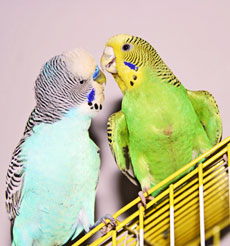
Though parakeets are very easy to take care of, owners must still take a few precautions to ensure that their pets are healthy and live to a ripe old age.
Parakeets Care and Safety-Hygiene
How would you feel if you lived in a filthy, smelly home? And how long would you survive? But parakeets depend entirely on their owners for clean surroundings. Be sure to line the bottom of their cages with brown paper, with any printed logos lying face down. Newspaper ink can stain the bird’s feathers. You can also use plain paper towels or a thin layer of gravel. Cage lining should be changed every day, or every other day at most.
Parakeets Care and Safety-Temperature
The parakeets’ natural habitat is the hot, dry desert of Australia, where the average temperature is about 70 to 80 degrees Fahrenheit. Where temperatures soar to the high 90’s during summer, they escape to the cool shade of the trees. During winter, they migrate to warmer countries.
Domestic parakeets are trapped in cages, so owners have to set the temperature controls. Keep the thermostat at 70 to 80 degrees FMake sure that the cage is not placed near windows, or hot areas like the kitchen. They should also have a “shady spot” in the cage where they can retreat, and a bowl of fresh, cool water.
Parakeets Care and Safety-Health Risks
Parakeets have a genetic predisposition to developing a tumor between the age of five and seven years old. Be on the lookout for signs of illness, such as a sudden slowdown in activity, or difficulty balancing on a perch. Also examine your pet’s chest for any breastbones that may be sticking out.
Parakeets Care and Safety-Environment
Parakeets become nervous in a completely silent room. In the wild, absolute silence is usually an indication of a nearby predator. If you leave your pet for most of the day, leave the radio or television on.
Parakeets Care and Safety-Safety
Your parakeet needs time out of its cage so it can stretch its wings and explore. However, be sure to create a “bird-safe” environment.
Keep parakeets out of the kitchen. They are curious and resourceful animals, and may fall into a pot full of hot liquid, or get scalded on a stove. Heated Teflon pans also emit a gas that is potentially hazardous to birds. Lock the door when you’re cooking, or keep your pet caged at this time.
The bathroom is another safety hazard. Always close the lid of toilet seats, since birds can drown in mere minutes. Cover full pails or other “standing water”.
Remove poisons or toxins, from unhealthy snacks like chocolate, to poisonous plants like the seemingly harmless poinsettia. Parakeets like to nibble and can might easily mistake a bit of rat poison as an interesting “snack.” Since birds have very sensitive respiratory systems, it’s also dangerous to smoke or spray whenever they are in the room.
You should also make sure that the windows are closed, and the screens are secure. You can try keeping your bird in one or two rooms, but do hang a sign —“Parakeet Loose, Please Close the Door”—to remind members of the household.